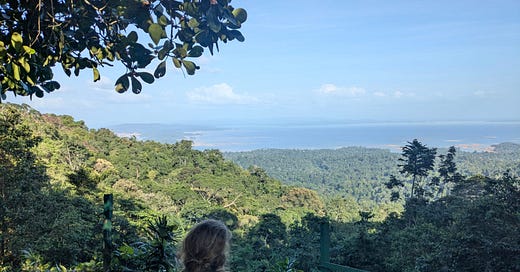Dutch courage: a cheapskate's guide to exploring Suriname
Trusting in strangers to get us up literal and metaphorical mountains
It was our penultimate day in French Guiana and Dave and I were eyeing up some roti at the Marché de Saint-Laurent in anticipation for our onward journey to Suriname. The market was busy, so we shared a table with a sharply-dressed man and his mother, and as so often happens, we got talking.
Amos was born in French Guiana but it sounded like he’d spent most of his working life in France. Now he was back for a while to stay with his mother, Alina, who was originally from Suriname.
As far as my understanding goes, movement tends to be quite fluid through the Guianan region – lots of people from these parts have mixed heritage and therefore family and connections in all three countries. Our first taxi driver, Patrick, who took us from the border in Saint Georges to Cayenne was a great example of that: he had grown up in French Guiana but his mother was Brazilian and his father was Guyanese – which meant he spoke English, Portuguese and French fluently, along with taki-taki Creole (or “Sranan Tongo”), which is spoken throughout Suriname and much of French Guiana.
Amos was similarly polyglottal, and keen to tell us that the roti we were eating was fine, but not nearly as good as the ones we’d get in Suriname. He was curious about us, confirming what we’d been told before in this region – that not many non-French tourists visit Guiana – and delighted in giving us some travel tips, such as exactly how much we should pay to get a car from the Surinamese border and where to eat and drink once we made it to the capital city, Paramaribo.
Alina’s demeanor was somewhat cooler, and I wondered if she was in fact taking the opportunity to power-nap behind her sunglasses, but then before I knew what was happening, she was on the phone arranging for some distant cousin Amos had never heard of to come and pick us up from the border. Stanga made the journey regularly, she told us, and he’d save us seats in his minibus for local prices (“don’t pay him any more than 300!”). We left with Amos and Alina’s phone numbers, Alina’s cousin Stanga’s, and “son of Stanga” – who it was agreed would be meeting us at the border the following day. “Call me anytime – for anything at all,” said Amos, and “it’s normal,” he shrugged when we thanked him and Alina profusely for their kindness.
We spent the remainder of our time in French Guiana exploring more abandoned prisons – that and cooking pasta in our ant-infested but affordable Airbnb, some 3km out of town. The Camp de la Transportation, in the town’s centre, was opened in 1858 as a point of arrival for French prisoners arriving in the colony for the first time, but many of them ended up living out their sentences there. It was interesting to learn about the prison’s three-tier class system: inmates could earn their way up the scale through good behaviour; “first class” prisoners were rewarded with better lodgings, cushier jobs with more possible free time, and so on.
As with most things in this country, there was very limited information available to us about the prison itself (opening hours, for instance) but we managed to find a helpful man in the nearby Office du Tourisme, who gave us a free map before ushering us quickly out the door because there was only five minutes to go until the office’s three-hour lunch break.
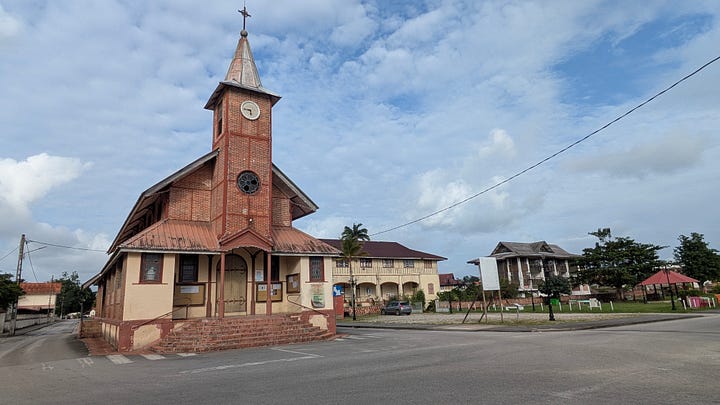

The Camp de la Transportation was also technically closed for lunch at this time, but there was nobody to stop Dave and I from wandering around the buildings armed with our new map – and actually, when it did open, there was a decent amount of information available in the site museum about the colonial prison system in general. We’d already visited the Îles du Salut while on a very lovely tour from Kourou, but it wasn’t until reading the displays inside the Camp museum (and deploying a bit of Google Translate) that I learned all the fun details.
For example, the "woods of justice" – ie, the foundation blocks for the guillotine – are present on both Île Royale and in Saint-Laurent-du-Maroni, but the business end was only erected once a year on average for executions. This reads a lot like propaganda (“it actually wasn’t that bad!”) so it’s worth noting that these beheadings were still carried out until 1945, which really doesn’t seem like that long ago for such a medieval method of capital punishment. But then again the last hanging in the UK took place in 1964. We’ve gone down a rabbit hole now on Google, so I’ll tell you while I’m at it that the only European country that still officially carries out executions is Belarus.
Anyway, the death penalty in France and its colonies had to be decided by the Special Maritime Court, and tended to be applied to prisoners guilty of “bloodletting guards or civilians during an escape attempt”. The executioner was always a “voluntary” convict, recruited by the administration, most often someone living outside the compound. Because another fascinating thing about the French Guiana penal system is that prisoners sentenced to less than eight years had to stay in the colony for an equivalent time after their sentence, a policy called doublage or “doubling”. Convicts sentenced to more than eight years had to remain in the colony for life, even after their sentence was supposedly spent.
When the prisons in French Guiana were slowly disbanded in the 1950s, most of the (ex?)prisoners stayed on. Which means yes, Dave and I did spend much of time walking around Saint Laurent pointing at people and speculating as to whether or not they were the offspring of murderers, so sue me.
It was surely an indictment of French Guiana’s exorbitant prices that on the morning of our departure to Suriname, the taxi driver we booked in with to take us to the border would only accept €10 for our €11.25 fare. It was an eight (8!) minute ride down to the port. But I didn’t try haggling with him – he just insisted. I suppose with our scrappy clothes and dirty backpacks we probably did look quite poor next to him and his very shiny Mercedes and matching Ralph Lauren shirt and shorts combo.
The previous day (Saturday) when asking for information about the ferry, our guy in the Office du Tourisme told us that the border control office was in fact closed on weekends. This created a bit of a puzzle over what to do about an exit stamp. Let’s not forget that we were in the EU – and now that the UK is out of it, we Brits are allowed to spend a maximum of 90 days there within any 180 day period. So I worried that this might cause a problem for me when I eventually landed back in Portugal to visit my parents later this year. Would the EU border officer accuse me of having outstayed my time if I’d technically not left France in six months? I’d had an argument with a particularly pedantic one once before who’d insisted on doing the maths on my passport, simply because I had a lot of European stamps. I think I had about three days to spare, but it was a bit close for comfort.
Now on the other side of the world, I did what any rational person would do in that moment and made a quick call to Norwich City Airport’s one-time head of customs control and immigration (aka, my dad) whose conclusion was “nah, wouldn’t worry about it” and so we opted to carry on with our schedule as planned.
In the meantime, word had clearly spread, and when we arrived at the dock on Sunday morning an irritable police officer was waiting for us by the otherwise closed-up immigration office. The taxi driver walked us over to the police officer, the police officer wordlessly took our passports off us and stamped them. “Are you normally open on the weekends then? Êtes-vous normalement ouvert le week-end?” I asked, always with half a mind on writing up French Guiana’s first and only complete English-language travel guide. “Non,” he replied, before closing the window in my face and sloping off to his car.
The tiny port was deserted but for a lone ferryman and his dugout canoe, to whom we were handed over swiftly by the well-connected taxi driver. Goodbye French Guiana and your €13 vegetables, I thought. Two minutes later we stopped to drop another passenger somewhere on the same side of the river and returned to the port we’d just left from. This continued for a while, but eventually we were deposited on the opposite bank – quite literally a river bank, which we scrambled up and walked towards the police station for immigration.
Suriname is the only country in South America that British citizens need to buy a visa for. We’d managed to do that quite easily online the previous week, but there was an additional form to fill in upon entry. It being a Sunday, and seemingly we the only foreigners crossing into the country, the immigration officer was friendly but impatient – he clearly had places to be – so told us just to complete the form “sometime before you leave Suriname if you can” and we were waved through.
Waiting for us inside the immigration office was an eager man with a surprisingly nice car. “Michelle?” he asked. “Son of Stanga?” I asked. “Yes!” he replied, “Michelle?” “Sure!” I replied.
Rachael, Michelle. Sounds kind of similar in a Suriname accent, right? We bundled into the car and sped off down the road. Then I thought I’d better check the price – Alina had given me strict instructions, after all – and this prompted a bit of confusion. Turns out our driver hadn’t been waiting for a Michelle (or indeed a Rachael) but a man called “Michael Allen” – presumably another gringo who had been left stranded at the border office in the time we’d been gone.
The man who wasn’t Stanga’s son did an about turn and left us on the curb again, where the real son-of-Stanga roared up a few minutes later in exactly the kind of beaten-up VW van we’d been anticipating, piled high with families and bin bags full of tree cuttings. It cost us the same amount of money to travel the two-and-a-half hours to Paramaribo with Stanga junior that it did to drive the eight minutes to the ferry port earlier that morning; we breathed a joint sigh of relief to be back in the vicinity of cheap beers once again.
We immediately got good vibes from Paramaribo. But while it was cheaper than French Guiana (where isn’t) accomodation prices were still higher than Brazil and other previously visited countries on the continent. A big contributing factor here is that Suriname really doesn’t get many foreign tourists, asides from retired Dutch people on set 10-day package tours (we met them all and so were quite familiar with the itinerary by the end of our visit). For this reason, hotels are expensive and there are very few backpacker hostels (I think there is one in the centre, connected to Zus&Zo café).
And so it was that Dave and I ended up staying for the best part of a week in a working opticians. Don’t pity us – I bloody loved it. Yes, our kitchen was the staff room, and yes it was frequented by snacking opticians at various points through the working day. No, we did not have to sleep in the room with all the glasses in. And the space was huge! We had an industrial-size washing machine at our disposal! And – because it was an office building – a cleaner came round every day to make the kitchen and bathrooms perfect and sterile once again. Loved it.
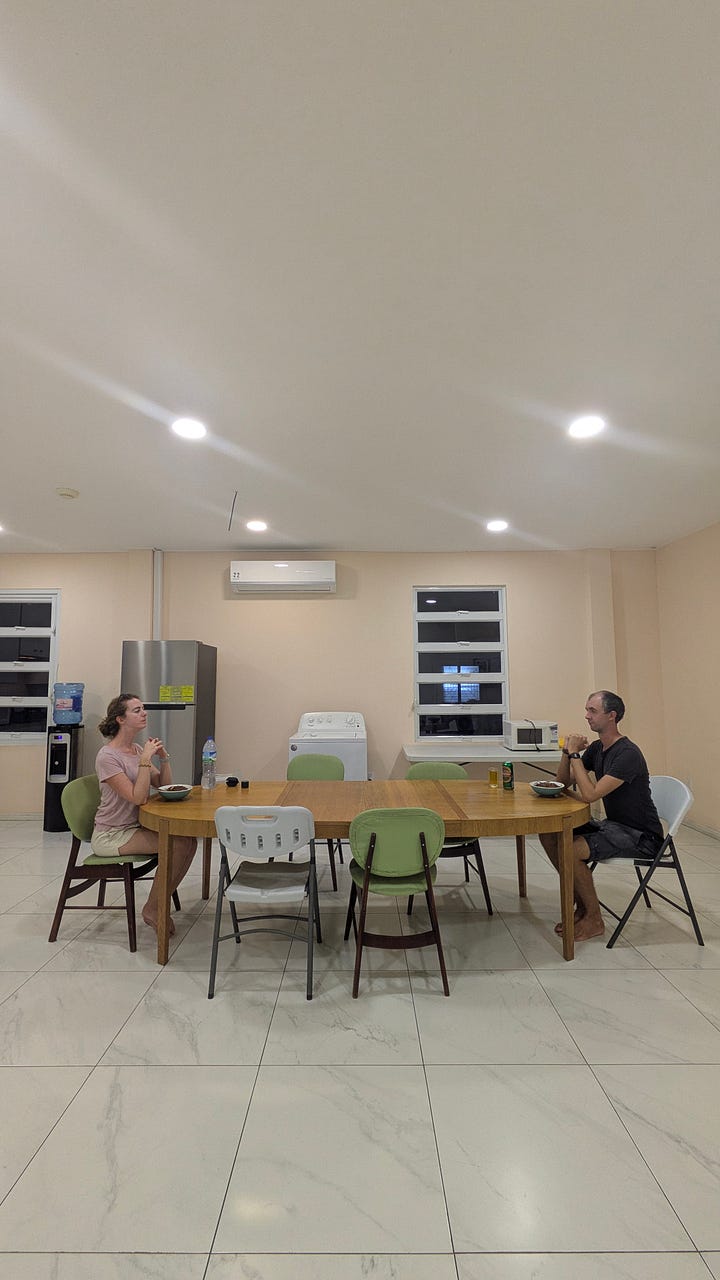
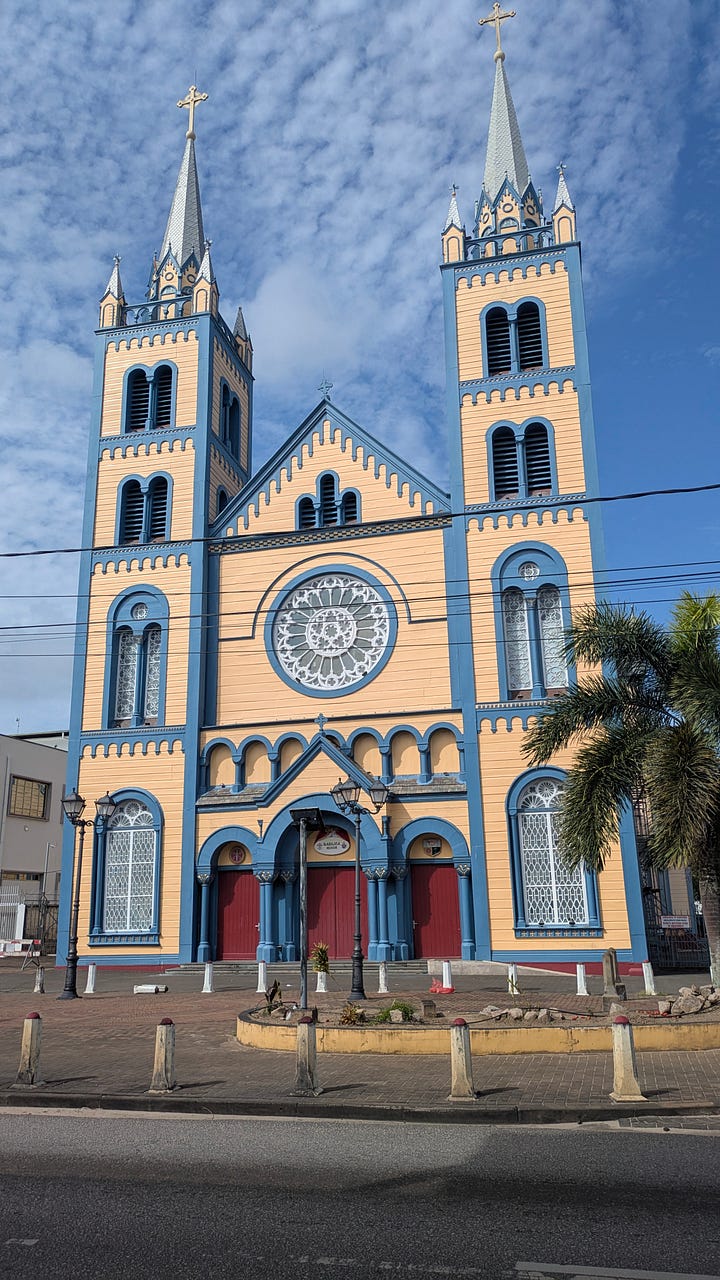
Remember Amos and his mother? He was right, their kindness was no anomaly. I can hands down say that Surinamese people are up there with the most friendly and generous people I’ve met in all the countries I’ve visited. It helped, of course, that pretty much everyone is fluent in English as well as Dutch and indigenous/ local Creole languages – Suriname was still a Dutch colony until 1975, so it fits that Surinamese people, much like the Dutch, are such proficient linguists. But they were also a very curious and extroverted bunch, fascinated to ask us about our travels and eager to share their own life stories (occasionally exhausting). I left every taxi driver’s car with a full break-down of his family tree, business ideas and childcare timetable. I know all the jobs and hobbies our dolphin spotting tour guide took up and abandoned during Covid. I really hope the nice woman we met in the Orange travel agency realises her dream of seeing Adele sing live.
People are trusting, too. Possibly because it’s a small place and probably not very difficult to track someone down if they owe you money. But there’s also a generosity of spirit that just does not exist at home. When we arrived in Paramaribo on that Sunday afternoon we had barely any cash on us – just enough to pay the driver – and the banks and ATMs were all closed. We headed to a bar-restaurant that had come recommended by our Airbnb host, and sat down to order some food after checking that they accepted card payments. When the bill came, we were told that actually they only accepted the local form of digital payment – not foreign credit cards – and so we were stuck. “No drama!” the manager told us, “Just come back and pay another day.” His strategy worked to be fair, because we ended up returning to that same bar for their excellent fish, beef and veggie burgers on three separate occasions before leaving Suriname.
Like everywhere else in the region, Suriname is a very naturally beautiful, full of lush rainforest, with lots to see and do. But as with French Guiana, there’s not much information going around about how to see and do it all without paying seriously big bucks through a tour agency. A big proportion of the costs come down to transport –anytime you want to visit a nature reserve or waterfall or plantation outside of the city, tour agencies will quote sometimes hundreds of dollars just for the private car transfer. And unlike French Guiana, which did have some public bus routes (they just tried to keep them secret from us), Suriname really doesn’t have much in the way of official public transport – people get around via hitchhiking or colectivo-style minivans.
A nice man in the Zus&Zo café-cum-tourist-agency had taken one look us and told us that actually, we didn’t need an agency, we were perfectly capable of getting to some of these nature reserves ourselves – if we had the luxury of time, and the willingness to be flexible and a little adventurous. At the top of this list of possibilities was Brownsberg Nature Park, just a couple of hours south of Paramaribo. A two-day, one-night trip up to the top of Brownsberg mountain booked through the Paramaribo tour agencies came at a set price of $195 per person (US dollars). But if we could get up there ourselves, a room in the government-managed hostel would cost us around $10. It was a no-brainer.
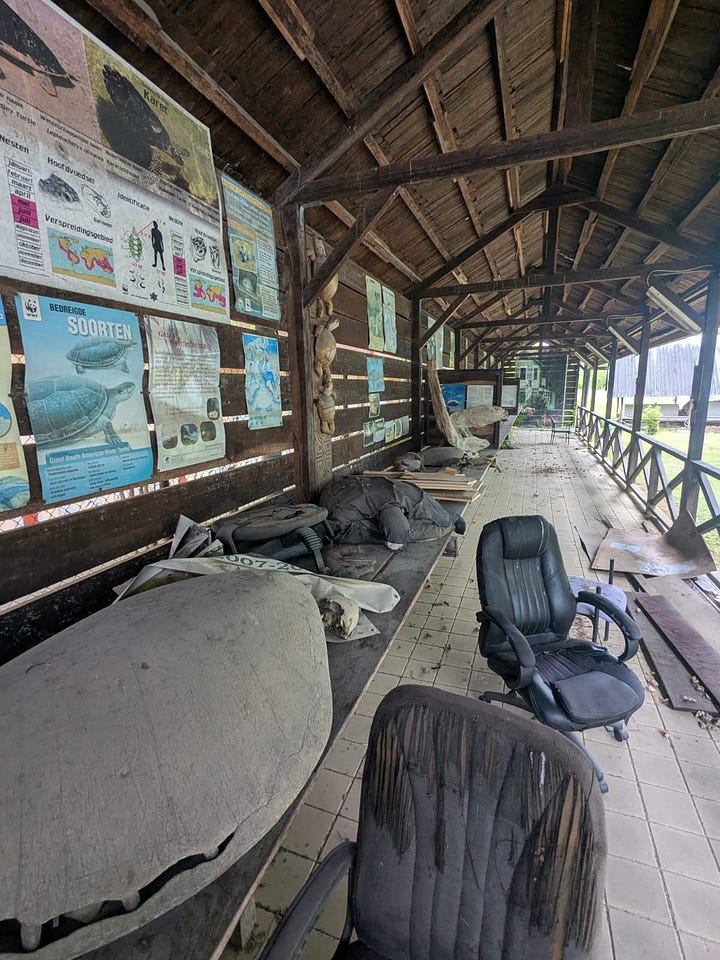

The first step was finding someone who worked at the government’s department of tourism, Stinasu – a small office in/outside one of Paramaribo’s classic Dutch-colonial wooden buildings that had quite literally half fallen down. Among the debris we saw signs of life – desks and computers, a map, a light on in the toilet – but over three days of trying, never any people inside. Paramaribo is a very early city where most offices close for the day as early as 2pm (even the rum museum only offers morning tastings) but these guys didn’t seem to be bothering to come back after their 11am lunch break. A sign outside offered an address for a website that had expired years ago, and a Gmail address that I tried, but doubt anyone was checking.
On the fourth day of trying, we found someone inside. After all our trouble, I was expecting to be laughed out the door but she didn’t seem completely surprised to see us, and handed over a price sheet detailing different rooms and a small park conservation fee. “Just pay them on the door, no need to book ahead,” she said. We could take a minivan to the neighbouring town of Brownsweg and try to catch a ride the rest of the 13km up the mountain, but she couldn’t guarantee if any cars would be passing, so we should be prepared to walk. Oh, and there probably wouldn’t be any way to buy food up there, so we should take our own. Would there be anyone up there at all? She seemed doubtful, and yet somehow also encouraging. We left the office with more questions that we’d come in with, but figured that we’d built the idea up so much by now that we had to at least give it a try.
And so, the following morning, we left our big backpacks with the opticians and set out to find a bus or minivan – or anyone heading that way. We armed ourselves with water, hammocks, enough clothes for two days, a pack of bread rolls, cheese and a packet of “chicken ham” which Dave had deduced wasn’t close enough to real meat to do us any damage should it get sweaty over multiple days. It took a bit of finding, but eventually we were pointed to a section of street known informally as the place where people with minivans stopped with the intention of going south towards Brownsweg. And there we found Josh.
Josh was a character. He lived part the week in the city and the rest of his time in Brownsweg, he explained. It was immediately clear that he slept most nights in his car. But he was heading to Brownsweg imminently, he confirmed, and once we agreed a price he cleared out some of his empty bottles, reattached some seats for us, and the three of us were on our way.
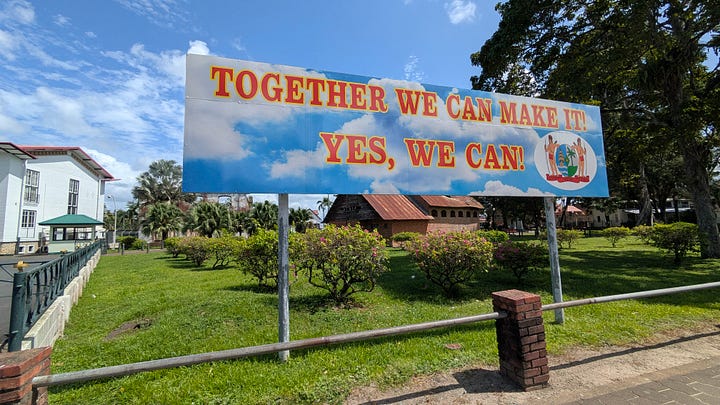
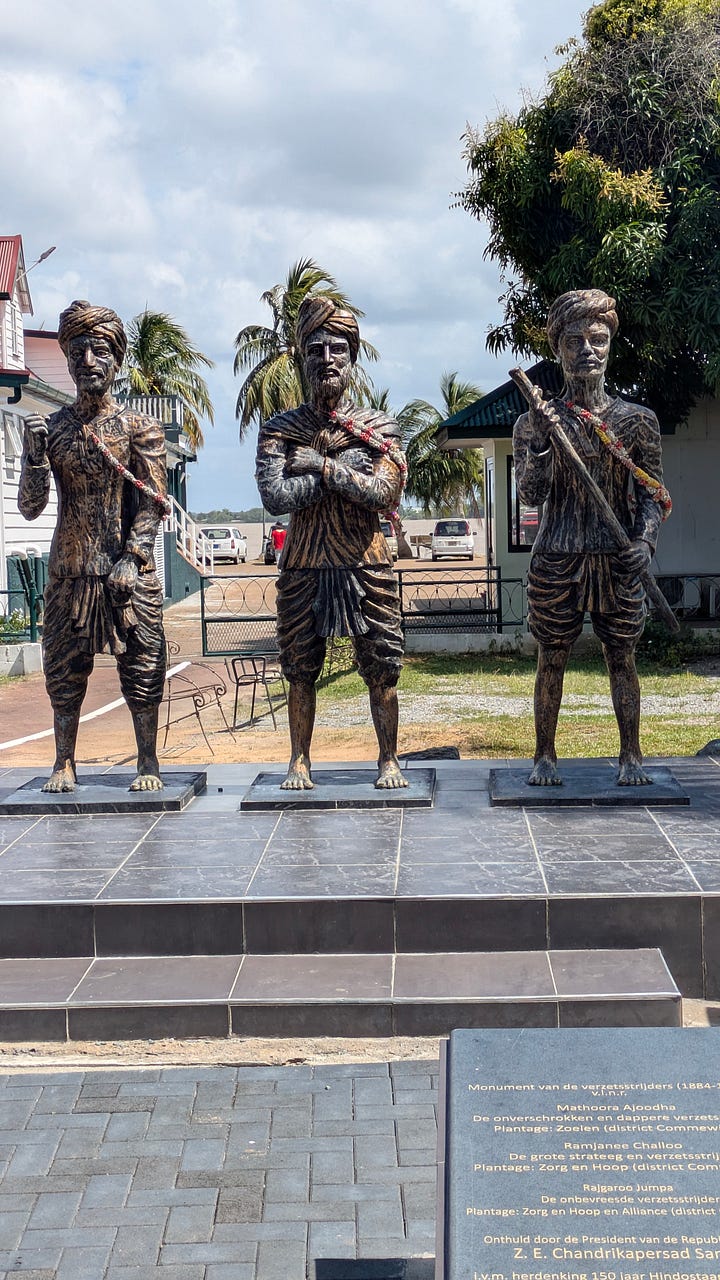
There was traffic coming out of Paramaribo, and this bothered Josh so we stopped for him to pick up some beers for the journey. At some point he remembered a promise to find a jacket for a friend of his back in the village, so we also stopped at several department stores selling everything from charcoal to tractors along the way. None of them had the kind of jacket Josh needed, or else he forgot that was his purpose because each time he returned to the car either empty handed or holding a beer. His friend would have to wait.
An hour into the trip, Josh informed us he was taking us on a detour to witness Suriname’s largest power plant – a matter of pride for the region, clearly, as he gave us some hard-hitting stats about its workforce and production levels. Crucially, the power plant was also quite close to where Josh’s nephew lived, so he swung by his street holding down the horn until someone went to fetch him. Josh’s nephew was a smoothly put-together guy who didn’t seem especially surprised by the unannounced arrival of his uncle – nor indeed annoyed for having waited possibly days for Josh to have secured enough passengers to warrant making it down there.
Josh’s nephew climbed on board and we were off again – but only after another quick stop to the corner shop to buy more beers. The men returned with some Pepsi for Dave and I, which I thought was a nice touch. We drove off once more, but just with one more stop to see Josh’s nephew’s older brother – whose house was back the way we’d just come, presumably within close walking distance to Josh’s nephew’s house, but never mind. Josh’s nephew’s older brother (Josh’s second nephew? Who knows) was in the process of building a very impressive house – or at least it would be impressive once the second floor was in and the roof was on. For now they seemed to be concentrating on the huge greek-style concrete pillars out front, which framed the front door beautifully. A brief conversation, a shake of the hand, and Josh and Josh’s nephew (but not the older one) were back in the van and this time we really were on our way.
Almost three hours after leaving Paramaribo, our 75-minute journey to Brownsweg was complete. Previously, Josh had been confident that we’d be able to hitch a ride going the rest of the way up the mountain, but as we parked up in the village he seemed less sure. Without us asking, Josh conducted a poll of all the drivers in the square to see if any of them fancied taking us – the answer came back no. We’d have to walk. But we’d be fine, Josh said - he’d climbed it once as a young man. “Just watch out for the snakes and tigers.”
Josh dumped his nephew in the square and told him he’d be right back. When we saw the craters in the road, we soon understood why nobody in a normal car was willing to take us up the path towards Brownsberg – but Josh did his best for half a kilometre, before admitting defeat and waving us off with a hand-drawn map. He believed in us, and that made me believe in us too. Or, at least, in a few days’ time when someone found our bodies, he might remember something about us and the information would get back to the British embassy. If there was an embassy in Suriname, and if Josh sobered up enough.


It started to rain, and never really stopped. I gave up on my trusted plastic poncho as a device for keeping dry at around kilometre three, instead wrapping our bags with it as best we could and sacrificing our bodies to the elements. It was a tough walk, but more so for the river and puddle-dodging than the climb. Three hours later, we arrived at the top of Brownsberg Nature Park to find the remains of some guest lodges – and not a soul around.
I’d mentally prepared for this as best I could – that’s what the hammocks in Dave’s bag were for – but there was something about the mysterious abandoned buildings and haunted air that suddenly made me feel a bit wobbly about staying here alone, not least because it was clear we’d be destroyed by mosquitos if we slept outside. We walked to the outer perimeter of the camp to inspect the view.
Eventually, I heard a voice – and spotted the tall, army-build Dutch man attached to it. He was a teacher visiting Suriname with his dozen-or-so high school pupils on some sort of “survival camp”, and yes there were some staff members here at the reserve – he’d go and wake them up. The school teacher seemed a bit tense, which I suspect was partly his personality and partly because he’d had to take his group’s local guide to hospital the day before after he’d been bitten by a coral snake.
The guide survived, though it was touch and go for a few hours, and was already back here at work on the premises to warn us against picking up any snakes we couldn’t confidently identify. He’d arrange for a room to be made up for us. Look, it was bleak lodgings. No, I’m not confident that the bedsheets were clean. We appeared to have come on scout camp by mistake. But the rain had stopped. There was rice and chicken available for dinner. Everything was going to be ok.
Travel bits and tips from this week
In Saint Laurent we visited the Camp de la Transportation for free. The Camp de la Relégation, also known as St Jean, is another abandoned prison camp 17km from St Laurent, but that's only open to visitors on weekends and you must book an organised tour through the Office du Tourisme.
Be aware that like a lot of places in French Guiana, Saint Laurent’s Office du Tourisme’s lunch hour spans the majority of the working day, and they take it very seriously.
When it wasn’t five minutes before meal time, the people inside the office were actually very helpful. It was the only place we saw in French Guiana with tourist information leaflets, maps, etc, and with hindsight I wonder if travelling through the country would be a whole lot smoother and more navigable if one were to arrive in Saint Laurent first, travelling west to east (we went east to west).
In Saint Laurent we mostly ate in our Airbnb but we did enjoy a good lunch at the central market (open Wednesdays and Saturdays) and a drink at the Café Friends of Nereids.
In Paramaribo we had lunch at Zus&Zo and if I’m honest the food was borderline terrible but the guy who ran the place went out of his way to give us loads of free travel advice which was good of him.
We kept going back to Tori Oso bar and restaurant
And we stayed in this Airbnb, which was a working opticians and it was wonderful.

